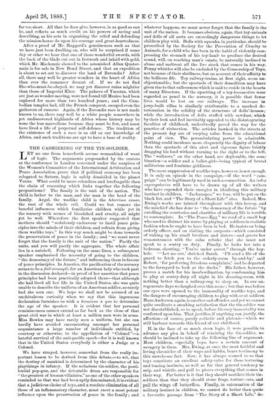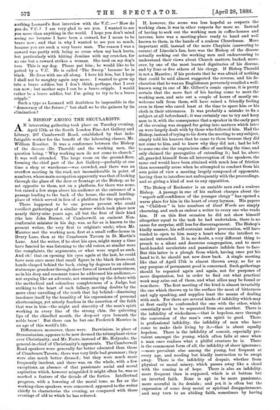THE CASHIERING OF THE TIN-SOLDIER.
TET no one from henceforth accuse womankind of want .4 of logic. The arguments propounded by the orators at the conference in London convened under the auspices of the Women's Committee of the International Arbitration and Peace Association, prove that if political economy has been relegated to Saturn, logic is safely domiciled in the planet Venus. What could be more relentless and irrefragable than the chain of reasoning which links together the following propositions ? The family is the unit of the nation. The child is father to the man, and the man is the head of the Argal, the warlike child is the teterrima eausa, the root of the whole evil. Could we but remove the baneful influences which familiarise children while yet in the nursery with scenes of bloodshed and cruelty, all might yet be well. Wherefore the first speaker suggested that mothers should "sedulously endeavour to instil peace prin- ciples into the minds of their children, and refrain from giving them warlike toys." In this way much might be done towards the preservation of peace in the family; and "we must never forget that the family is the unit of the nation." Pacify the units, and you will pacify the aggregate. The whole affair lies in a nutshell. Following on the same lines, a subsequent speaker emphasised the necessity of going to the children, "the democracy of the future," and influencing them in favour of peace principles. In America, the pacification of the nursery seems to be a fait accompli, for an American lady who took part in the discussion declared—in proof of her assertion that peace principles had been practically adopted there—that although she had lived all her life in the United States, she was quite unable to describe the uniform of an American soldier, so rarely had she seen one. We hope we shall not be accused of an unchivalrous curiosity when we say that this ingenuous declaration furnishes us with a terminus a quo to determine the age of the speaker. It is evident that her personal reminiscences cannot extend as far back as the close of that great civil war in which at least a million men were in arms. Miss Bowles may have rarely seen a uniform, but she can hardly have avoided encountering amongst her personal acquaintance a large number of individuals entitled, by courtesy or otherwise, to the appellation of "Colonel "—a hateful survival of the anti-pacific epoch—for it is well known that in the United States everybody is either a Judge or a Colonel.
We have strayed, however, somewhat from the really im- portant lesson to be derived from this debate,—to wit, that the destiny of mankind is determined by the character of his playthings in infancy. If the nefarious tin-soldier, the pesti- lential pop-gun, and the detestable drum are responsible for "the greatest of human villainies," as one of the other speakers reminded us that war had been aptly denominated, it is evident that a judicious choice of toys, and a resolute elimination of all those of an inflammatory character, must exert a most potent influence upon the preservation of peace in the family; and , whatever happens, we must never forget that the family is the unit of the nation. It becomes obvious, again, that toy-animals and dolls of all sorts are exceedingly dangerous things to let children play with. Dolls with squeaks, in particular, should be proscribed by the Society for the Prevention of Cruelty to Animals, for a child who has been in the habit of violently com- pressing the stomach of his toy-lamb to produce the desired sound, will, on reaching man's estate, be naturally inclined to abuse and maltreat all the live stock that comes in his way. Penny whistles will also be excluded by the Censorship of Toys, not because of their shrillness, but on account of their affinity tø the bellicose fife. Toy railway-trains, at first sight, seem un- objectionable; but the spectacle of their demolition may have given rise to that callousness which is said to reside in the hearts of many Directors. If the upsetting of a toy-locomotive were regarded as penal in the nursery, it is possible that fewer lives would be lost on our railways. The increase in jerry-built villas is similarly attributable to a marked de- terioration in the solidity of the structure of dolls'-houses ; while the introduction of dolls stuffed with sawdust, which by their look and feel inevitably appealed to the disintegrating faculties of childhood, undoubtedly paved the way for the practice of vivisection. The articles hawked in the streets ikt the present day are of varying value from the educational point of view. The perambulating porter is admirable. Nothing could inculcate more eloquently the dignity of labour than the spectacle of this alert and vigorous figure briskly dragging his load without turning to the right or to the left: The "waltzers," on the other hand, are deplorable, the coin; bination—a soldier and a ballet-girl—being typical of brutal militarism and feminine giddiness.
The mere suppression of warlike toys, however, is not enough. It is only an episode in the campaign,—if the word "cam paign " can be legitimately used in such a connection. An index. expurgatorius will have to be drawn up of all the writers who have expended their energies in idealizing this military instinct in children. "Jackanapes," we fear, will be put on the black list, and "The Story of a Short Life" also. Indeed, Mrs. Ewing's works are tainted throughout with this heresy, and the mischief she has done to "the democracy of the future "by extolling the courtesies and charities of military life is terrible to contemplate. In "The Peace-Egg" we read of a small boy who used to distract his nurse by playing at soldiers in realistic fashion when he ought to have been in bed. He insists on being orderly officer, and on visiting the outposts—which consisted of waking up his small brothers and sisters—and greets her remonstrances with the calm rebuke that she must not speak to a sentry on duty. Finally, he locks her into a bedroom, shouting, "You're under arrest," through the key-
hole. "Let me out,' shrieked Sarah. send a file of the guard to fetch you to the orderly-room by-and-by,' said Robert, for preferring frivolous complaints,' and he departed to the farmyard to look at the ducks." His father, however, proves a match for his insubordination, by condemning hini to play at sentry-duty all night in his dressing-room, with nothing better than a railway-rug to sleep on. In our un- regenerate days we laughed over this scene ; but that was before our eyes were opened to the immorality of warlike toys, and the dangers of encouraging children to play with or at soldiers. Hans Andersen, again, is another sad offender, and yet we cannot
quite eradicate a sneaking satisfaction that the tin-soldier was not disestablished, so to speak, before literary immortality was conferred upon him. That justifies, if anything can justify, the affection—of course, purely wsthetic and platonic—which we still harbour towards this friend of our childhood.
If, in the face of so much stern logic, it were possible to advance any plea in behalf of retaining the tin-soldier, we should be inclined to take up the following line of argument.
Most children, especially boys, have a certain amount of savagery in them. Mrs. Ewing, at once the most faithful and loving chronicler of their ways and habits, bears testimony to
this unwelcome fact. Now, it has always seemed to us that toys constitute an excellent safety-valve for these torturing and teasing instincts, as well as for that general tendency to snip, and whittle, and pull to pieces everything that comes in their way. Far better is it that they should mutilate their tin-
soldiers than that they should stone frogs, torture cats, and pull the wings off butterflies. Finally, in extenuation of tbe military instinct in children, we cannot do better than quote a favourite passage from "The Story of a Short Life," de- scribing Leonard's first interview with the V.C. :—" How do you do, V.C. ? I am very glad to see you. I wanted to see you more than anything in the world. I hope you don't mind seeing me because I have been a coward, for I mean to be brave now ; and that is why I wanted to see you so much, because you are such a very brave man. The reason I was a coward was partly with being so cross when my back hurts, but particularly with hitting Jemima with my crutches, for no one but a coward strikes a woman. She trod on my dog's toes. This is my dog. Please pat him ; he would like to be patted by a V.C. He is called The Sweep' because he is black. He lives with me all along. I have hit him, but I hope I shall not be naughty again any more. I wanted to grow up into a brave soldier, but I don't think, perhaps, that I ever can now ; but mother says I can be a brave cripple. I would rather be a brave soldier, but I'm going to try to be a brave cripple."
Such a type as Leonard will doubtless be impossible in the "democracy of the future ;" but shall we be the gainers by its elimination ?



































 Previous page
Previous page